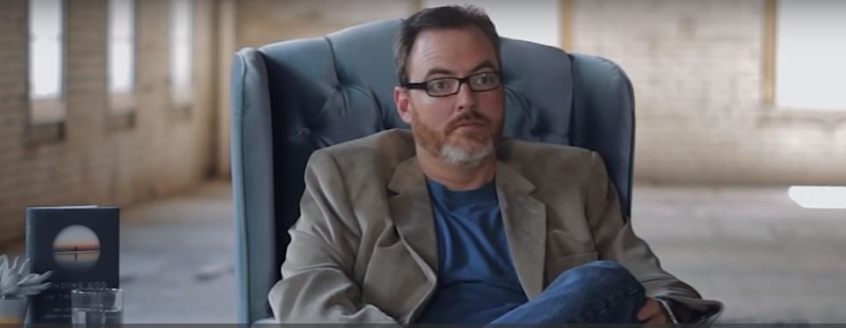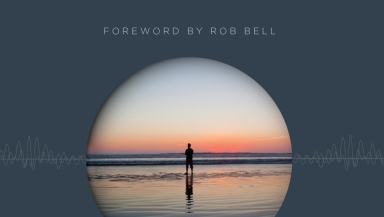'Institutional Western Christianity seemed to me to have little to do with the work of Christ. Then I noticed the first people to show up after any natural or humanitarian disaster were Christians. I noticed the people who gave the largest percentage of their income to charities, including secular charities, were Christians.'

Mike McHargue is also known as Science Mike and describes himself as 'a Christian-turned atheist, turned follower of Jesus'. His book, Finding God in the Waves has a sub-heading that would intrigue even the most convinced agnostic: 'How I lost my faith and found it again through science.'
Now a host of The Liturgists Podcast alongside Michael Gungor with more than a million downloads a month as well as his own Ask Science Mike weekly Q&A, McHargue says he is not trying to resolve the dispute between science and religion.
Instead he wants 'to propel us to a posture of humility in our knowledge, to embrace the limitations of human experience and ultimately use science and faith to catapult us into a freedom from our addition to certainty and instead to embrace the truest of all things which is that God is love.'
In an interview with Christian Today he describes his own loss of faith as 'awful' as he realised he longer believed what his conservative upbringing in a strict Baptist church had taught him.
'God wasn't just an idea to me. God had kept me alive in the roughest years of my life,' he says.
'The stakes were personal for me. When I realised I didn't believe in God at all it would have been easier to hear one of my parents had died. At least my parents were external to me but God was with me every moment of every day in times of sorrow and hope. The idea that God might not be there was both intellectually stimulating and ultimately terrifying.'

After months of plotting the demise of Christianity with a network of humanist and atheist friends he built up, McHargue says he slowly, cautiously, began to reconsider. But this came about, not through an encounter with Christian friends, but through studying science.
'There would be these great moments when I would read a book about neuroscience and literally run out of my room shouting "eureka!", he says.
'At the same time I was afraid. I didn't want to build a new theological house of cards that could be knocked over again. I didn't want to be wrong again. I wanted to make sure this time I built a perfect understanding of God that would be beyond question or critique of later failure.
'I got stuck there for over a year before I realised any idea I can have about God is just that – a human idea. What we are given by God is story and metaphor and image to relate to an ultimately unknowable thing that which created and sustains all that there is.'
So he arrived back at a Christian faith, albeit one very different from the one he left.
The book's foreword is by Rob Bell – considered beyond the pale by some hardline evangelicals after he raised the suggestion everyone might, eventually, go to heaven – and that would be enough to put off a large portion of McHargue's former Baptist colleagues.
But although he is critical, he manages to balance that with genuine warmth as he describes his re-entry into church life.
'I guess I expected a hero's welcome,' he says. 'What I have found instead is when you have been deeply immersed in a community of people and part of your personal journey involves a change of ideas – that community feels rejected by you.
'They feel betrayed. So the people who had lived out 35 years of my life of faith with, one day found me to be a stranger and they reacted with all the confusion and fear you would expect. It was not them it was me who changed.
'So I actually tried to be gracious to those who believe what I once did.
'I can't think where I have got now is some superior route of knowing God. God gives us the understanding we need to serve. We have got to hold space for those who react with a sense of betrayal or else we become a camp of warring factions and what does that tell the world about the message of Christ?'
He speaks with such sincerity that you believe him when he says: 'I have never met a church I didn't love.'
Southern Baptists, he says, have one of the lowest defection rates of any religious denomination in the US. But of those who do defect, a disproportionately large number became outright atheists.
'If you come from a theological framework that says this is the one truth and there is no other truths, and this is the one correct interpretation of God then people can either go all in or reject it completely,' he says. 'What we are seeing in the West right now is a generation has said I can't take all of it so I guess I'm out.'
He speaks of conservative evangelical churches as operating in a 'self-imposed sociological ghetto' with their agitated need to form strict boundaries of who is 'in or out'.
He says: 'If there is a God and that God is in control why do we feel God needs our defending insead of our trust and service?
'If the Bible is true then God has a plan for the redemption of all mankind that involves us being a good neighbour.'
But despite his fractious re-entry into the church, to the extent where he still meets considerable criticism, he says he can finally now call himself a Christian again.
'It was hard to call myself a Christian for a long time beause I thought of how my atheist friends experienced people who call themslves Christians. And I thought of how my gay and lesbian friends experienced Christians.'
But he adds: 'It appears that this global movement centred around the person of Jesus Christ has strengths and weaknesses. It has flaws and it has things it does better than anyone else. Because Christianity is made of people.
'Today I unhesitatingly count myself among their number. I am a Christian because I am a flawed human trying to do the work of Christ in this world.'













